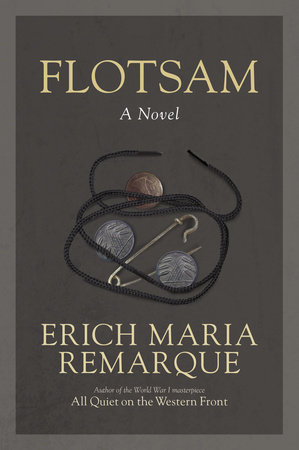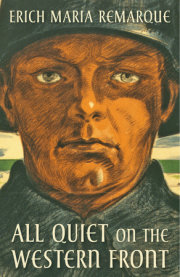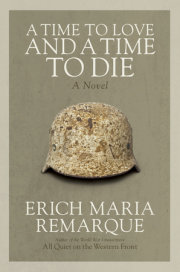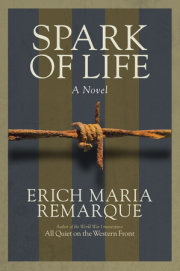Chapter One
kern awoke with a start out of a seething blackness and listened hard. Like all hunted creatures he was completely conscious at once, alert and ready for flight. As he sat motionless on the bed, his thin body bent forward, he debated how he could get away if the stairs were already occupied.
The room was on the fourth floor. A window opened toward the courtyard, but it had no balcony or cornice from which the gutters could be reached. Flight in that direction was out of the question. There was only one other way: along the corridor to the attic and from there across the roof to the next house.
Kern glanced at the illuminated dial of his watch. It was a little after five. The room was still almost black. On the two other beds the sheets gleamed indistinctly gray in the darkness. The Pole, who slept next to the wall, was snoring.
Cautiously Kern slid out of bed and crept to the door. At the same instant the man in the middle bed moved. “Is something wrong?” he whispered.
Kern made no reply; he kept his ear pressed to the door.
The other sat up and fumbled among the things on the iron bedstead. A pocket flash went on, catching in its wavering circle of pale light a section of the brown door, from which paint was scaling, and the figure of Kern, with mussed hair, in rumpled underwear and socks, at the keyhole listening.
“Damn it, what’s up?” hissed the man on the bed.
Kern straightened. “I don’t know. Something woke me, something I heard.”
“Something! What was it, you fool?”
“Downstairs, something downstairs. Voices, steps, something like that.”
The man got up and came to the door. He was wearing a yellow shirt from under which a pair of hairy, muscular legs protruded in the glow of the flashlight. He listened for a while, then asked, “How long you been staying here?”
“Two months.”
“Been a raid in that time?”
Kern shook his head.
“Aha! You’ve been hearing things. When you’re asleep a fart sometimes sounds like thunder.”
He threw the light in Kern’s face. “Well, well, barely twenty, eh? Refugee?”
“Of course.”
“Jesus Christus tso siem sta˘lo—” the Pole in the corner gurgled suddenly.
The man in the shirt let the beam of light slide across the room. Out of the darkness emerged a wild, black beard, a great gaping mouth and two deep-set, staring eyes under bushy brows.
“Shut up about Jesus Christ, Polack,” growled the man with the flashlight. “He’s not alive any more. Died as a volunteer at the Somme.”
“Tso?”
“There! There it is again!” Kern sprang toward his bed. “They’re coming upstairs. We’ve got to get across the roof.”
The other spun around like a top. There was a sound of closing doors and lowered voices. “Damn it! Get going! Polski, run for it! Police!”
He snatched his things from the bed. “Know the way?” he asked Kern.
“Yes. Along the hall to the right, up the stairs behind the sink.”
“Let’s go!” The man in the shirt opened the door noiselessly.
“Matka boska!” gurgled the Pole.
“Shut up! Don’t tell them anything!”
The man drew the door shut. He and Kern raced along the narrow, dirty hall. They ran so silently they could hear the leaky tap dripping in the sink.
“Turn here,” Kern whispered, swung around the corner and collided with something. He staggered, saw a uniform and tried to turn back. At the same instant he received a blow on the arm. “Stand still! Raise your hands!” someone commanded out of the darkness.
Kern let his things tumble to the floor. His left arm was numb from the blow that had hit his elbow. The man in the shirt looked for a second as if he were going to throw himself on the voice in the darkness. But then he caught sight of the barrel of a revolver, which a second policeman was holding against his chest. Slowly he raised his arms.
“Turn around!” ordered the voice. “Stand by the window!”
The two obeyed.
“See what’s in that stuff,” said the policeman with the revolver.
The second policeman searched the clothes lying on the floor. “Thirty-five schillings—a flashlight—a pipe—a pocketknife—a louse comb—nothing else—”
“No papers?”
“Couple of letters.”
“No passports?”
“No.”
“Where are your passports?” asked the policeman with the revolver.
“I haven’t one,” Kern said.
“Of course not.” The policeman poked his revolver into the ribs of the man in the shirt. “And you? Do I have to ask you separately, you son of a bitch?”
The man turned around slowly. “What do you mean, ‘son of a bitch’?” he asked.
The policemen looked at each other. The one without a revolver began to laugh. The other licked his lips. “Just look,” he said slowly, “a fine gentleman! His Excellency, the Bum! General Stinker!” He drew back his arm suddenly and struck the man on the chin. “Keep your hands up!” he roared as the other staggered.
The man looked at him. Kern thought he had never seen such a look. “I mean you, you bastard,” said the policeman. “Will you talk now? Or do you want me to jog up your brains again?”
“I haven’t a passport,” the man said.
“ ‘I haven’t a passport,’ ” the policeman mimicked. “Of course Herr Son of a Bitch hasn’t a passport. That’s what we thought. Go on, get your clothes on, quick!”
A group of policemen came running along the hall, pulling open doors. One of them with shoulder stripes approached. “Well, what have you caught?”
“A couple of birds that were trying to fly away over the roof.”
The officer looked at them. He was young. His face was narrow and pale. He wore a carefully trimmed, small, black mustache and smelled of toilet water. Kern recognized it; it was Eau de Cologne 4711. His father had owned a perfume factory; that’s how he knew about such things.
“We’ll take special care of these two,” the lieutenant said. “Handcuffs!”
“Are the Viennese police allowed to strike a man while making an arrest?” asked the man in the shirt.
The officer looked up. “What’s your name?”
“Steiner. Josef Steiner.”
“He hasn’t a passport and he threatened us,” explained the policeman with the revolver.
“There’s a lot more allowed than you think,” the officer said sharply. “Get them downstairs!”
The two put on their clothes, and the policemen got out handcuffs. “Come, my pets. There, now, you look better. Fit as if they were made to order.”
Kern felt the cold steel on his wrists. It was the first time in his life he had been fettered. The steel rings didn’t hinder him much in walking. But it seemed to him that they had shackled more than just his hands.
Outside was the light of early morning. Two police wagons stood in front of the house. Steiner made a wry face. “First-class funeral. Pretty fine, eh kid?”
Kern did not answer. He was hiding the handcuffs under his coat as well as he could. A few milkmen were standing in the street, watching eagerly. In the houses opposite windows had been raised. Faces gleamed like dough in the dark openings. A woman giggled.
About thirty people had been arrested and were now being loaded into the uncovered wagons. Most of them climbed in silently. The owner of the building was among them—a fat, bright-blond woman of fifty. She alone was raising an angry protest. Several months before she had converted, in the cheapest possible fashion, two empty floors of her dilapidated house into a kind of pension. Word soon got around that one could sleep there without being reported to the police. The woman had only four legitimate boarders who had passports and were registered—a peddler, a rat-killer, and two whores. The others crept in after dark. Almost all were emigrants and refugees from Germany, Poland, Russia, and Italy.
“Get in, get in!” the lieutenant was saying to the landlady. “You can explain all that at the police station. You’ll have time enough for it there.”
“I protest—” screamed the woman.
“Protest all you like. Right now you come along with us.”
Two policemen seized the woman under the arms and lifted her into the wagon.
The lieutenant turned toward Kern and Steiner. “Now, these two. Keep a special eye on them.”
“Merci,” said Steiner and got in. Kern followed him.
The wagons drove off. “Have a good time!” shrieked a woman’s voice from one of the windows.
“Slaughter those refugees!” a man roared after them. “It’ll save you food. Heil Hitler!”
The streets were still almost empty and the police cars moved rather fast. Behind the houses the sky receded, became brighter and wider and of a transparent blue; but the prisoners stood in a dark group on the wagons like willows in the autumn rain. Two of the policemen were eating sandwiches. They washed them down with coffee out of flat-bottomed tin cans.
Near the Franz Josef Bridge a vegetable truck crossed the street. The police cars stopped with a jolt and then started on again. At that moment one of the prisoners climbed over the side of the second car and jumped off. He fell diagonally across the mudguard, became entangled in his coat, and struck the pavement with the sound of a cracking branch.
“Stop! Back up!” shouted the leader. “Shoot if he moves!”
The truck jolted to a stop. The policemen scrambled down. They ran to the place where the man had fallen. The driver looked around. When he saw that the man wasn’t trying to get away, he slowly backed up the machine.
The man lay prostrate. He had struck the pavement with the back of his head. Lying there with arms and legs spread out in his open overcoat, he looked like a great bat that had crashed to earth.
“Bring him back!” shouted the lieutenant.
The policemen bent over. Then one straightened up. “He must have broken something. He can’t stand.”
“Of course he can stand. Put him on his feet.”
“Give him a good kick. That’ll fix him up,” the policeman who had struck Steiner advised casually.
The man groaned. “He really can’t stand,” reported the other policeman. “His head’s bleeding, too.”
“Damnation!” The leader climbed down. “No one is to move!” he shouted up at the prisoners. “Damned riffraff. Nothing but trouble.”
The wagon now stood close to the fallen man. Kern could see him clearly from above. He recognized him. He was an emaciated Russian Jew with a ragged, gray beard. Kern had slept a few times in the same room with him. He remembered clearly how the old man had stood at the window in the early morning, with the phylacteries over his shoulders, bending slowly back and forth in prayer. He was a peddler of yarns, shoelaces, and thread, and had been expelled from Austria three times.
“Come on, get up!” the officer ordered. “What did you want to jump out of the wagon for anyway? Had too much of a record to face, eh? Been stealing and God knows what besides.”
The old man moved his lips. His staring eyes were turned toward the lieutenant.
“What’s that?” the latter asked. “Did he say something?”
“He says he did it because he was afraid,” said the policeman kneeling beside him.
“Afraid? Of course he was afraid. Because he’s broken the law. What’s he saying now?”
“He says he’s done nothing wrong.”
“Everyone says that. But what are we going to do with him? What’s wrong with him anyway?”
“Someone ought to get a doctor,” Steiner said from his place in the wagon.
“Shut up!” the lieutenant barked nervously. “Where are we going to find a doctor at this hour? We can’t leave him lying here on the street indefinitely. Later they’d say we did this to him ourselves. The police get blamed for everything.”
“He ought to be in a hospital,” Steiner said. “Right now.”
The officer was confused. He saw now that the man was seriously injured and that made him forget to silence Steiner. “Hospital! They won’t take him in just like that. You have to have a certificate. That’s something I can’t arrange alone. First I have to report the case.”
“Take him to a Jewish hospital,” Steiner said. “They’ll take him in there without a certificate or a report. Even without money.”
The lieutenant stared at him. “How do you happen to know so much?”
“We ought to take him to the dispensary,” one of the policemen proposed. “There’s always an intern or a doctor there. They can find out what’s wrong. And at least we’ll be rid of him.”
The lieutenant had made up his mind. “All right, lift him in. We’ll drive by the public dispensary. One man can stay there with him. What a damned nuisance!”
The policemen hoisted the man up. He groaned and turned very pale. They placed him on the floor of the wagon. He shuddered and opened his eyes, which shone with unnatural brilliance in his sunken face. The lieutenant bit his lips. “What a fool trick! Jumping out of a truck, an old man like him. Go on, but drive slow.”
Under the wounded man’s head a pool of blood slowly formed. His gnarled fingers scrabbled over the floorboards of the truck. His lips slowly retracted baring his teeth. It was as though someone else were laughing silently and scornfully behind a death-shadowed mask of pain.
“What’s he saying?” the lieutenant asked.
The policeman knelt down again and steadied the old man’s head against the jolting of the truck. “He says he wanted to get to his children,” he reported. “Now they’ll starve to death.”
“Oh, nonsense. They won’t starve. Where are they?”
The policeman bent down. “He won’t say. Otherwise they’d be deported. None of them has a permit.”
“That’s a lot of nonsense. What’s he saying now?”
“He says he wants you to forgive him.”
“What?” the lieutenant asked in amazement.
“He says he wants you to forgive him for the trouble he has caused you.”
“Forgive him? What does he mean by that?” Shaking his head, the officer stared at the man on the floor.
The car stopped at the dispensary. “Carry him in,” the lieutenant ordered. “Take it easy. And you, Rohde, stay with him till I telephone.” They lifted the injured man. Steiner bent over him. “We’ll find your children. We’ll look after them,” he said. “Do you understand, friend?” The Jew closed his eyes and opened them again.
Then three policemen carried him into the building. His dangling arms dragged helplessly over the pavement as though he were already dead. After a short time two policemen came back and got in again. “Did he say anything else?” asked the lieutenant.
Copyright © 1998 by Erich Maria Remarque. All rights reserved. No part of this excerpt may be reproduced or reprinted without permission in writing from the publisher.









